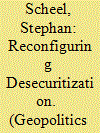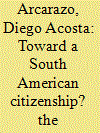|
|
|
Sort Order |
|
|
|
Items / Page
|
|
|
|
|
|
|
| Srl | Item |
| 1 |
ID:
188514


|
|
|
|
|
| Summary/Abstract |
This article introduces desecuritization as the missing supplement of the conception of securitization as a dispersed social process. It calls for the creative development of approaches that destabilise the credibility of security professionals’ claimed expert knowledge. To illustrate the potential of this approach, the article combines insights from the sociology of ignorance (agnotology) and the autonomy of migration literature to deconstruct the framing of migrants as cunning tricksters, a narrative that features prominently in processes of securitization. Within the Schengen visa regime discussed in this article, the trickster narrative emerges in the portrayal of visa applicants as deploying various modes of deception like ‘document fraud’ or ‘visa shopping’. Based on ethnographic fieldwork at consulates in North Africa, this article demonstrates, in contrast, that practices like applying at a consulate known for a more liberal decision-making practice constitute coping strategies by which migrants try to mitigate the uncertainty that a culture of suspicion, the discretionary power of consular staff and the heterogeneity of opaque decision-making criteria create for them. Ultimately, the analysis shows that security practices produce not only knowledge, but also various forms of nonknowledge which provoke the instances of ‘trickery’ that ever more pervasive security practices are supposed to forestall.
|
|
|
|
|
|
|
|
|
|
|
|
|
|
|
|
| 2 |
ID:
165901


|
|
|
|
|
| Summary/Abstract |
It is well established in the literature that migration has become increasingly securitized. In this article, we examine the racialized and gendered grids of intelligibility that make securitizing moves possible in the migration context. Specifically, we argue that the securitization of migration during the so-called EU refugee crisis comes into being through intertwined and mutually dependent representations of racialized, masculinized threat and racialized, feminized vulnerability, which are woven into the scaffolding of colonial modernity. We construct our argument through an analysis of relevant newspaper articles published in British newspapers between September 2015 and March 2016. Accordingly, our discussion advances understandings of the dominant narratives through which the ‘refugee crisis’ has been understood. In addition, in highlighting the naturalized inequalities that underpin securitizing speech acts, the article also contributes to literature that seeks to add an improved understanding of power to securitization theory.
|
|
|
|
|
|
|
|
|
|
|
|
|
|
|
|
| 3 |
ID:
138417


|
|
|
|
|
| Summary/Abstract |
Migration law may be discussed as an example of a clash between two central contradictory globalization processes: first, the transformation of political membership through new forms of quasi-citizenship and their impact for traditional understandings of identity and belonging in the national polity, and second, the securitization of migration and the attempt by the state to control its borders, considered as its “last bastion of sovereignty.” The outcome of this dispute results in conflicting mechanisms of inclusion and exclusion and in illiberal state practices, contrary to fundamental rights, with profound implications for the rule of law in Europe and elsewhere. South America has usually been neglected in academic debates on migration law. This is regretful for two main reasons: first, the development of new liberal ideas on migration in the region which challenge established assumptions on the regulation of migration in Europe, the United States, and elsewhere, and second, the parallel establishment of a South American citizenship. This article will look at this aspect, in particular the Mercosur Residence Agreement, which establishes a free movement of people regime in South America. Its drawbacks and potential will be outlined before exploring possible future scenarios and their importance for other regions, including the European Union (EU).
|
|
|
|
|
|
|
|
|
|
|
|
|
|
|
|
| 4 |
ID:
157101


|
|
|
|
|
| Summary/Abstract |
This article offers a process-mechanism explanation of securitization. To make the case for a process-mechanism account more concrete, I use interpretivist process tracing to explain the crisis episode of the Sun Sea, a Thai cargo ship carrying Sri Lankan asylum-seekers, and the securitization of irregular migration in Canada. Drawing on interviews and grey literature, the article shows how securitization was possible and under what conditions, and argues that ideational dispositions of security organizations induced state officials toward a security interpretation of the the Sun Sea. The article aims to demonstrate that process-mechanism explanations represent a compelling methodological alternative with which to trace and explain securitization. The article sees itself as part of a broader refinement of a sociological variant of securitization theory. It seeks to examine and enhance the contribution that this ‘post-Copenhagen’ approach – its core assumptions and theoretical framework – makes to the analysis of securitization.
|
|
|
|
|
|
|
|
|
|
|
|
|
|
|
|
|
|
|
|
|